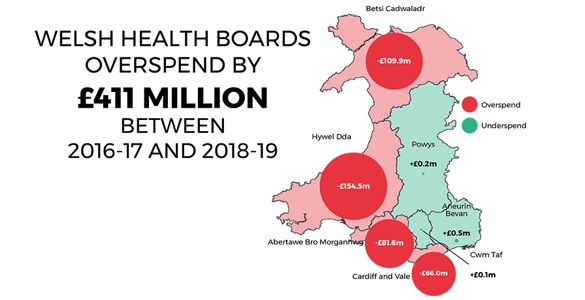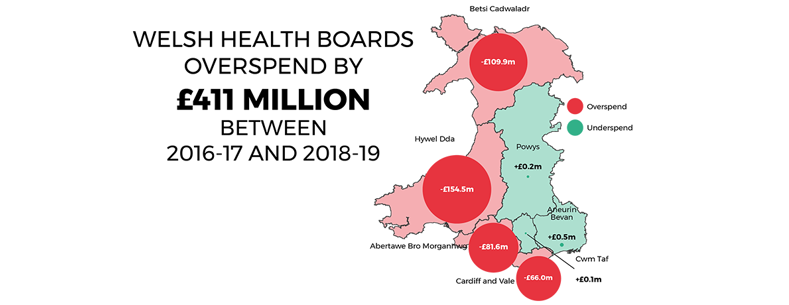The 2016-17 and 2017-18 accounts reported that, overall, Local Health Boards (LHBs) in Wales overspent over three years by £253 million and £365 million respectively. On 12 June 2019, the Auditor General for Wales laid the annual accounts for 2018-19 for the seven LHBs and three NHS Trusts in Wales at the National Assembly for Wales. This article sets out whether these latest accounts report an improvement in the financial performance of NHS bodies in Wales.
Our article, ‘A financial health check - have local health boards and NHS trusts in Wales met their financial duties?’ explained the statutory requirements on LHBs in Wales set out in the National Health Service Finance (Wales) Act 2014. This introduced two statutory financial duties which require LHBs to:
- Manage their resources within approved limits, or break-even, over a three-year rolling period.
- Prepare and have approved by Ministers a rolling three year Integrated Medium Term Plan (IMTP).
Guidance issued by Welsh Government confirmed that the statutory financial duties also apply to NHS Trusts in Wales.
According to the accounts for 2018-19, overall, LHBs have reported a deteriorated financial position, with the net overspend increasing over the three years to £411 million. The performance of individual LHBs is shown below.

The same four LHBs reported overspends in the three years to March 2019 as in the previous two rolling three-year periods. However, performance at individual LHBs has varied.
While Abertawe Bro Morgannwg University Health Board (now known as Swansea Bay University Health Board), Cardiff and Vale University Health Board and Hywel Dda University Health Board did not break even again in 2018-19, their financial performance has improved. The aggregate deficit as reported by these three LHBs for 2018-19 is £73.5 million less than it was in 2017-18, reducing from a deficit of £128.7 million to £55.2 million from 2017-18 to 2018-19 respectively. However, Betsi Cadwaladr University Health Board reported a higher deficit; its overspend increasing from £38.8 million to £41.3 million from 2017-18 to 2018-19.
The four LHBs that failed to break-even did not have an approved three-year IMTP, meaning that they also failed to meet the second statutory financial duty. A summary of the performance by LHBs and NHS Trusts against the first and second statutory financial duties is shown below.
On 12 June 2019, the Minister for Health and Social Services, Vaughan Gething AM, issued a written statement about NHS financial performance in 2018-19. This noted that the Welsh Government had allocated an additional £10 million each for Abertawe Bro Morgannwg and Cardiff and Vale University Health Boards, and an additional £27 million annually to Hywel Dda University Health Board. The Minister said:
“Overall, and taking account of the additional funding allocated in year outlined above, the net outturn for NHS Wales in 2018-19 is an improvement of £24 million compared with the previous year on a comparable basis. This provides demonstrable progress of increasing financial stability for NHS Wales, a reflection of the additional investment Welsh Government is providing in line with the recommendations from the Nuffield Trust along with improvements in NHS financial management. Following my approval of seven Integrated Medium Term Plans for 2019-20, I am expecting a further improvement in financial positions to be reported at the end of this financial year.”
The Research Service’s publication, “20 years as a devolved nation - how has Wales changed? Devolution 20” reports that the costs of delivering NHS services have continued to increase, and now account for over half (52.3%) of the Welsh Government’s total resource budget, compared with 39.8% in 2010-11.
The Auditor General for Wales reports that the increase in the Welsh Government’s health revenue budget for 2018-19 was not sufficient to meet existing and new cost pressures. He notes “all NHS bodies needed to make savings and find ways to manage cost pressures across the year”.
Savings are made by delivering services at lower cost or more efficiently, or by stopping the activity that incurs the cost. The scale of savings delivered by LHBs and NHS Trusts in Wales from 2011-12 to 2018-19 is shown below. This shows that, since 2011-12, NHS bodies in Wales have collectively delivered savings in excess of £100 million each year.
NHS bodies in Wales – savings made, 2011-12 to 2018-19 (£ million)
 Source: Auditor General for Wales NHS Finance Data Tool, Planned and actual savings
Source: Auditor General for Wales NHS Finance Data Tool, Planned and actual savings
The savings made by individual LHBs and NHS Trusts, as well as other information about the financial performance of NHS bodies, are set out in a new data tool that the Auditor General for Wales published on 12 June 2019.
While recognising that it has been a challenging year for NHS bodies and noting that it is encouraging that all LHBs have continued to deliver savings, the Auditor General for Wales reports that “it is not acceptable that … four health boards remain in breach of their legal responsibilities to live within their financial means”.
Article by Joanne McCarthy and Joe Wilkes, Senedd Research, National Assembly for Wales






